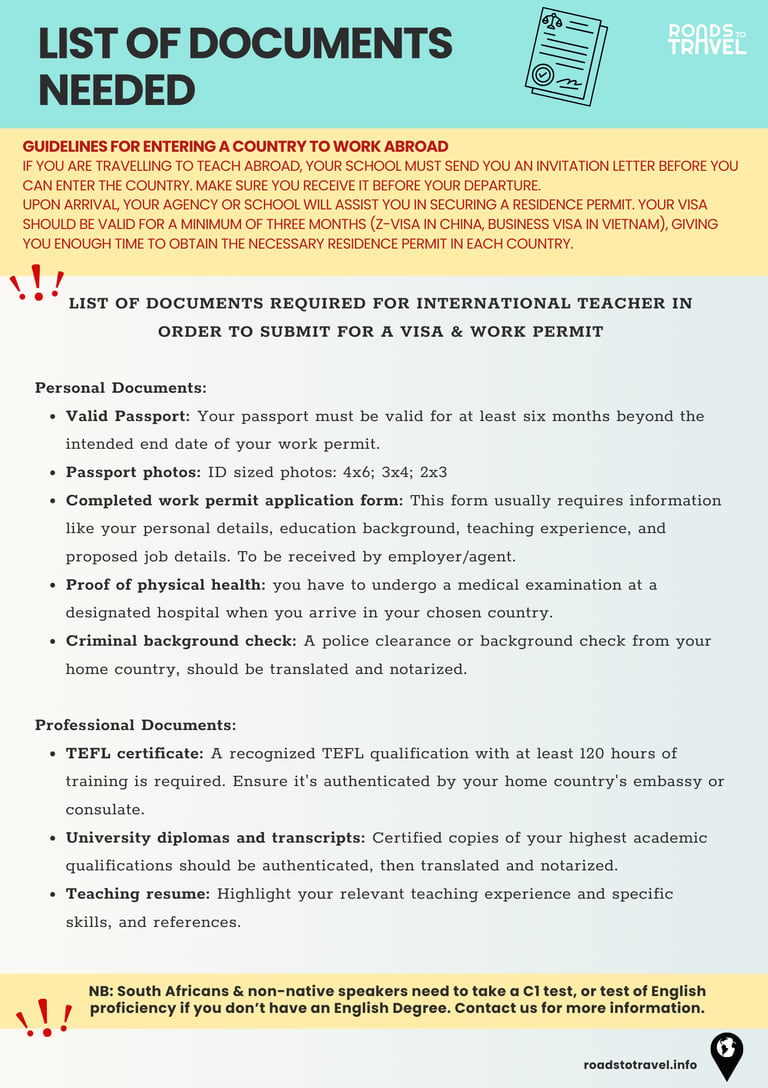
Catch Your Next Opportunity
"I want to teach abroad but I don't know where to start"
Teaching English abroad can feel overwhelming at first: recruiters, documents, job boards, and all the “what ifs.” We’ve been there. This guide breaks it down step by step, so you know where to start.
Recruiters offer valuable expertise for job seekers abroad. Their extensive networks connect you to hidden opportunities, while their knowledge of visa requirements and school cultures smooths the transition. They advocate for your qualifications, saving you time and frustration, and can even negotiate competitive salaries and benefits.
Job Matching: Agents connect you with reputable schools aligned with your qualifications, preferences, and desired location.
Housing: Some agencies offer free housing, compensation, or assist in house hunting. Some also provide accommodation on your arrival for at least 1 week. This is invaluable for new travellers who are on a tight budget.
Paperwork Peace of Mind: Visas, contracts, flights – agent expertise demystifies the process. They guide you through paperwork, ensuring a smooth arrival and stress-free start.
Cultural Concierge: They offer invaluable support in helping you set up bank accounts, get sim cards and give general advice, helping you adjust seamlessly to life in the new country.
Community and Support: Through an agency, you can connect with other teachers and build a valuable network and community to navigate your adventure.
PROS: Recruiters & Agents offer useful assistance for new traveller

"Do I use an agent?"
CONS: While many recruiters and agencies are helpful, there are a few things to watch out for:
"How to find a safe agency?"
Most teachers do just fine using recruiters, but it’s smart to be cautious:
Research reviews: Look for teacher reviews on expat forums, Reddit, or Facebook groups about the agency.
Ask clear questions: Before signing, ask about salary, location, hours, housing, and who pays the visa fees.
Trust your gut: If an agency avoids your questions or pressures you to accept quickly, that’s a red flag.
Look for transparency: Good agencies will be upfront about where you’re placed, what you’ll earn, and what support they’ll provide.
Less desirable placements: Some agencies may push you toward jobs in small towns or on the outskirts of a city, even if you were hoping for a more central location.
Lower salaries: In some cases, the school pays the agency a fee, which means your take-home pay might be less than if you applied directly.
Unethical practices: Although rare, there are stories of agencies mishandling visas, delaying paperwork, or even holding onto passports, which is not legal.


Recruiters usually ask for the following documents when you apply to teach abroad. These were specific to Vietnam and China.


Similar documentation, translation, and notarization processes will likely apply to other countries. This process will require both time and financial investment. Translation and notarization of documents typically take about one to two months. See below South African agencies that can assist with document translation and notarization for specific countries.
Check out our TEFL resources to guide you with your TEFL application!
"What's Authenticating Documents?"
When you land a teaching job abroad, certain documents need to be authenticated, notarized, and translated to secure your visa. It’s a detailed process that might take some time, but it’s absolutely worth it once everything is in place.
Notarized: This means having an official stamp or signature from a notary public or authorized office to confirm your document is real.
Translated: If your documents are in a language other than the language of the country you're going to, they need to be translated by a certified translator.
Authenticated: This process ensures your documents are valid and recognized by the government. It involves getting stamps from different authorities in your home country and in the country you will live in.




Start your journey toward your dream job today!
Explore these platforms to compare offers, including salary, benefits, and other opportunities, and get inspired to take the next step in your career. Many job postings on these sites are shared by TEFL recruiters or agencies who can connect you with schools, while others come directly from the schools themselves. Take a look and see where your next adventure might take you!
TEFL jobs abroad


